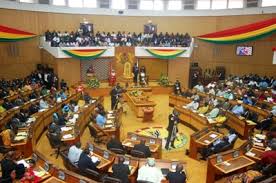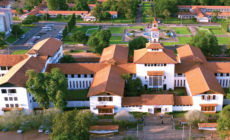Road closure at University of Ghana infuriates MPs
- Posted on
- Comment
 The University of Ghana, Legon, may soon lose its powers, if any, to restrict use of its roads as thoroughfares.
The University of Ghana, Legon, may soon lose its powers, if any, to restrict use of its roads as thoroughfares.
Some Members of Parliament (MPs) have started an open campaign aimed ultimately at clipping the wings of the authorities of the University over the divisive restriction on use of Legon’s roads as thoroughfares.
Apparently, the MPs have been rattled by the controversial decision of school authorities not to allow vehicles without Legon’s GHc400 stickers to use roads within the University as thoroughfares.
At a charged Parliamentary sitting on Tuesday, a day after some MPs were reportedly refused access to the University. Deputy Majority Leader, Alfred Kwame Agbesi, said: “The University should not be a Republic onto itself”.
His comments echoed public outrage triggered by Legon’s contentious car sticker policy. The enforcement of which has been the cause of massive traffic jam in parts of Accra since Saturday.
“Mr. Speaker, this morning, I listened to some parents who have their wards at the University of Ghana and they were complaining about the decision of the University,” Mr Agbesi said.
He also recounted the story of some colleague MPs who were allegedly prevented by Legon security men from entering the University on Monday.
He added, “The issue is that the University Council has taken a decision and members of the public are not so happy about the decision. Mr. Speaker, this House is the House of the representatives of the people. And the matter has come to our attention, and since we represent the people we must bring our concerns to the attention of the University Council that they should take a second look at the decision they have taken”.
The Deputy Majority’s Leader’s comments were in support of his colleague MP for Asawase, Alhaji Mohammed Mubarak Muntaka, who had earlier drawn the Speaker’s attention to the chaos triggered by Legon’s contentious sticker policy.
According to the Asawase MP, Legon’s GHc400 Sticker Policy, violates an agreement the University had with Parliament prior to the passage of the University of Ghana Bill into an Act.
Mr. Muntaka recalled that on Thursday July, 22, 2010, he moved a motion in Parliament seeking to have the House eliminate clause 3 [2] of the University of Ghana Bill because of the potential for its misuse.
The said provision, which later became law, reads: “A person who is not a member of the University shall not enter the premises of the University or have access to facilities or privileges of the University without the permission of the University.”
According to Mr. Muntaka, his motion sparked a stormy debate on the floor, compelling the presiding Speaker to defer a vote on the subject.
The House, he explained, passed the said clause days later only after it received assurances from a delegation from the University that the school had no intention of using the provision to “restrict access”.
“They came, they met us and they pleaded that ‘no’ it is not for them to use it. They want it to be there so that when other people decide to organize to come and create problems they could use it as basis to prevent them from entering the University,” he told the House at Tuesday’s sitting.
“We had the understanding with the University authorities then that this clause was not to restrict movement…” he added.
Speaking to CitiNews after today’s proceedings of Parliament, Mr. Muntaka said the recent decision, therefore, of Legon authorities to use the provisions of section 3[2] of the University of Ghana Act to “extort” money from car owners using roads within the University as thoroughfares must be challenged.
He has therefore served notice that he will press the Ministry of Education to bring the University of Ghana Act back to Parliament for MPs to expunge the provisions that seem to be the basis for Legon’s GHc400 sticker policy.
Mr. Muntaka had earlier expressed a similar sentiment during Tuesday’s sitting of Parliament. He said, “…Mr. Speaker, the problem is to say that some persons must have a sticker before they can have access; that is restriction because if you don’t have the sticker you will not be able to have access.
“…We should not allow this kind of restriction to prevail at the University of Ghana because it will not serve the collective interest of the people of this country.”
His comments received strong support from the Deputy Majority Leader, Alfred Kwame Agbesi.
“My suggestion is that we need to bring the law back to this House to take a second look at it” the Ashaiman MP said. “…If is necessary an amendment should be procured. The issue is serious; members of the public are being restricted [by the University] and restriction is something we should not countenance”.
Deputy Minority Leader, Dominic Nitiwul, backed Mr. Agbeshi’s call. “The problem is that the people of Ghana who are visiting the University of Ghana are complaining… Five Members of Parliament yesterday were turned away at the University of Ghana even though the authorities there knew that they passing through to do Parliamentary duties. They were turned away…”
Papa Owusu Ankoma disagrees
But, Sekondi MP, Papa Owusu Ankoma, took a contrary stance during Tuesday’s discussion on the floor.
“Mr. Speaker, I don’t want to appear to be defending the University. No one has been restricted access to the University except that if you are entering the University you must use the main gate, Okponglo, that is all. I mean I don’t have a problem,” he said.
In his ruling, First Deputy Speaker, Ebo Barton Odro, said: “I get the sense of the House and therefore I would want to direct that the Minister for Roads, together with the Minister for Education should liaise with the Committees on Education as well as Roads and Highways to specifically find an amicable solution to this problem. It has nothing to do with the tolls, which is a subject matter before the Supreme Court”.
Joint Committee given two weeks
The presiding Speaker gave the Joint Committee up to two weeks within which to submit its report to Parliament.
The brouhaha over Legon’s roads started in February after authorities introduced road tolls last month in a bid to raise money to pay off a loan it had taken to repair roads within the school.
The University’s abortive road toll policy provoked public anger compelling National Security Coordinator, Larry Gbevlo-Lartey (retired), to order demolition of one of the toll booths being put up by the authorities at the Okponglo entry to the campus. Col. Gbevlo-Lartey defended the action on grounds that the uncompleted structure was inappropriately sited.
Mr. Gbevlo-Lartey added that the location of the booth was a threat to human security and created vehicular congestion.
By: Richard Dela Sky










 (Selorm) |
(Selorm) |  (Nana Kwesi)
(Nana Kwesi)